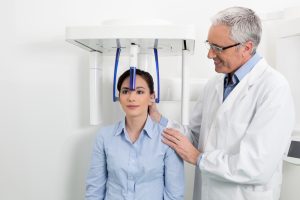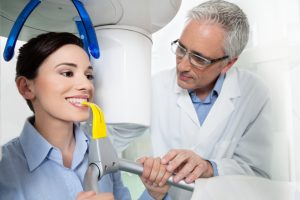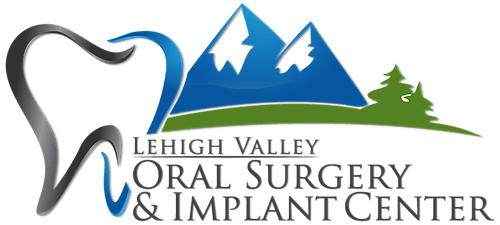Advanced Technology: Improving Your Oral Surgical Treatment
Advancements in dental technology have made oral surgery procedures more efficient and easier for both oral surgeons and patients. That’s why, at Lehigh Valley Oral Surgery and Dental Implant Center, Dr. Ahmad Chaudhry provides CBCT (Cone Beam Computer Technology) scans to assist in creating custom treatment plans for patients based on their specific needs.
Discover how our oral surgeon in Lehigh Valley, PA, utilizes CBCT scans to improve treatment for patients in Allentown, Fullerton, Middletown, and surrounding areas.
What is CBCT Scanning?

During a CBCT scan, the imaging machine rotates around the patient’s head and, in less than one minute, generates about 150 to 200 images from various angles compiled into one precise 3D image.
How CBCT Scans Improve Oral Surgery Procedures
CBCT scans are advanced imaging technology that allows our Bethlehem oral surgeons to see detailed, 3D images of a patient’s teeth, jaws, and other oral structures. These images provide valuable information that can help improve the planning and execution of oral surgery procedures, such as:
- Improved diagnosis and treatment planning
- Better assessment of jaw bone quality
- Reduced radiation
- Anatomic variations
- Impacted teeth
Our CBCT Services
Dental Implants
The placement of dental implants is crucial to their overall success. The virtual model Dr. Chaudhry creates with your CBCT scans identifies the densest areas of your jawbone and allows him to note any potential issues that could interfere with placing your implant.
Traditional X-Rays were used in the past, but the value they provide is limited. Thanks to CBCT scans, Dr. Chaudhry can place your implants with unmatched confidence and precision.
Wisdom Teeth Removal
To successfully and safely remove wisdom teeth, it helps to have detailed images. Sometimes, wisdom teeth become impacted, meaning they can be positioned against sensitive nerves or other teeth. Dr. Chaudhry can ensure a safe and pain-free extraction by obtaining CBCT scans with a highly detailed look at your teeth, mouth, and jaw.
Nerve Mapping
Your face and jawbone are full of sensitive nerve endings, and these nerves can’t sustain damage in any way during oral surgery procedures. Before surgeries such as dental implant placement or wisdom teeth removal, Dr. Chaudhry will use the CBCT scanner to identify the location of all the nerves in your mouth. This allows him to avoid these areas during procedures.
The CBCT Scan Process

As the patient sits still and places their mouth around the sensor, the cone beams take hundreds of images, which allows the technology to create one precise 3D image of the inner mechanisms of the jaw and face. CBCT scanning allows our Stroudsburg oral surgeons to zoom in on specific areas and view them from multiple angles.
Frequently Asked Questions
Are CBCT scans safe?
Yes, CBCT scans are safe when used by an oral surgeon or qualified health professional. While it is true that CBCT scans use ionizing radiation, the amount of radiation exposure is considered low. The radiation dose from a single CBCT scan is similar to that of several traditional X-rays. Additionally, technological advances have led to reduced radiation dose per scan, making CBCT scanning safer.
How are CBCT scans different from X-rays?
CBCT scanning uses a cone-shaped X-ray beam that rotates around the patient’s mouth to produce images from many angles, creating a 3D image. This allows for a more comprehensive view, which can help detect conditions that traditional X-rays may miss. Oral surgeons often rely on CBCT scans to better plan and perform procedures like dental implant placement or wisdom tooth extraction.
How long does a CBCT scan take?
A CBCT scan typically takes only a few minutes to complete. A sensor will be placed in the patient’s mouth. The patient will then be positioned on a table or in a chair, and the scanner will rotate around the patient taking multiple images. The entire process usually takes less than 15 minutes. The details of your scan depend on the information your oral surgeon wishes to obtain.
What conditions can a CBCT scan help diagnose?
CBCT scans can detect various oral health conditions:
- Impacted teeth
- Dental infections
- Loose teeth
- Cysts and tumors
- TMJ disorders
- Sinus pathologies
- Oral pathologies
CBCT scans can evaluate and diagnose a wide range of oral health complications. This advanced dental technology can help improve patient outcomes.
Experience the Precision of CBCT Scans With Dr. Chaudhry
In addition to helping Dr. Chaudhry provide safer and more effective treatment, our CBCT scanner can give you added confidence in your treatment. Dr. Chaudhry will show you exactly what he’s seeing on the monitor and point out any issues. This allows you to be fully educated going into your procedure and trust our Lehigh Valley oral surgeon with your smile.
To schedule an appointment with Dr. Chaudhry, call our Bethlehem office at (484)-821-1357 or our Stroudsburg office at (484)-821-1357. You can also book a consultation online by filling out our contact form.
Get your new smile started NOW!

